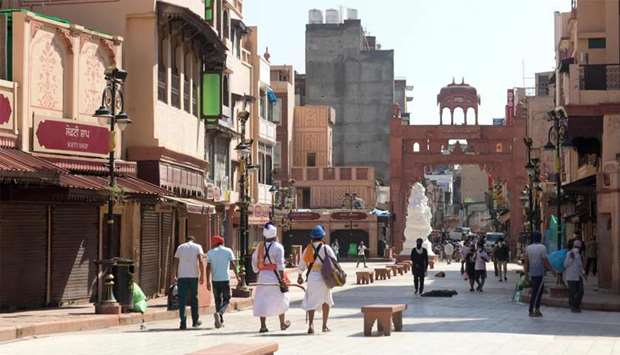India reported a record daily jump of coronavirus infections on Saturday, bringing the total near 3mn and piling pressure on authorities to curb huge gatherings as a major religious festival began.
The 69,878 new infections - the fourth straight day above 60,000 - take India's total cases to 2.98mn, behind only the United States and Brazil.
Covid-19 deaths increased by 945 to 55,794, data from the federal Health Ministry showed.
Amid the pandemic, there is some reason to cheer, however.
India has achieved a record high of 63,631 recoveries in a day, the Health Ministry said.
"With this high number of Covid-19 patients recovering and being discharged from hospitals and home isolation, the recovery rate has reached 74.69%. This has also led to declining case fatality rate, which stands at a new low of 1.87% today," the ministry said.
For most of western India, especially Mumbai, the 11-day Ganesh chaturthi festival is usually celebrated with big public gatherings.
Cases have plateaued in Mumbai, which now averages just above 1,000 a day and has recorded more than 134,000 in total.
But strict pandemic regulations have meant the festival season, which begins this month, has been lacklustre.
Authorities have imposed tough anti-coronavirus restrictions on gatherings and the size of Ganesha statues.
Most major cities have ordered that effigies of the popular elephant-headed Ganesha, which can draw thousands of people onto the streets, be shrunk back.
Traditionally, the statues can tower 10m (30ft) high or more and need dozens of people to carry them but this year authorities said they can be no more than 1.1m tall in a bid to cut crowds.
In New Delhi, no Ganesha idols will be shown in public while Mumbai has cut back access to the seafront to immerse Ganesha figures, usually the highlight of the festival.
Tens of thousands traditionally flock to the beaches on the final day of the festival to immerse elaborately decorated figurines in the Arabian Sea.
This year, authorities in India's financial capital have constructed hundreds of artificial immersion ponds across the city to stop hordes crowding the waterfront.
People will also be able to leave their elephant statues at collection centres and volunteers will immerse them in the sea.
Authorities want people to mark the festival at home, dampening enthusiasm among pandemic-weary locals.
Even the statues worshipped at home must be no more than 33cm.
"Every year I looked forward to Ganesha celebrations and visited a nearby lake to watch statue immersions. But this year, we are not even inviting friends home for traditional prayers," Mumbai-based analyst Ruta Amin said.
"With lively music, colours, and rituals, the Ganesha festival always brought communities together. But 2020 is muted and sad," the 27-year-old said.
In a sign of the times one of the rare Ganesha elephants on display sprays sanitiser onto the hands of people who come to pray.
People are barred from making public offerings to the statue and organisers have been ordered to sanitise outdoor marquees several times a day.
Some cities which have seen a surge in coronavirus cases had proposed a complete ban on Ganesha gatherings in public.
But in Bengaluru, authorities relented following protests by religious groups.
Public displays of the elephant figures will still be restricted with socially distanced followers having to wear masks.

